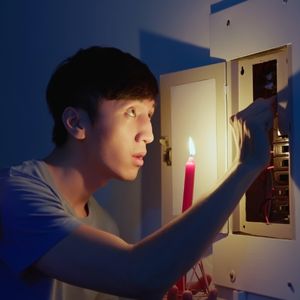Power Outage After Severe Weather
 It's important to have a plan in place for your household to handle an extended power outage after severe weather. Below are some tips!
It's important to have a plan in place for your household to handle an extended power outage after severe weather. Below are some tips!
Before the storm
- Create (or update) an emergency supply kit to save valuable time later. The kit should include everything an individual or family would need for at least two weeks, especially medicines, water, nonperishable foods and other supplies that might be hard to find after a storm hits.
- Keep a portable radio or TV or a NOAA weather radio on hand to monitor weather forecasts and important information from state and local officials.
- Charge cellphones, computers and other electronic devices in advance of storms to stay connected to important safety and response information. Consider purchasing portable chargers and make sure they are fully charged as well.
- Maintain a plan to move family members – especially those with special needs – to a safe, alternative location in case an extended power outage occurs, or evacuation is required.
- Pet owners should arrange to stay at evacuation shelters that accept pets; friends' or family members' homes; or pet-friendly hotels.
After the storm
- Stay away from power lines that have fallen or are sagging. Consider all lines energized, as well as trees, limbs or anything in contact with lines.
- If a power line falls across a car that you are in, stay in the car. If you MUST get out of the car due to a fire or other immediate life-threatening situation, do your best to jump clear of the car and land on both feet. Be sure that no part of your body is touching the car when your feet touch the ground.
- Duke Energy Customers:
- Report your outage by texting OUT to 57801, report online, or call 800.543.5599.
- You can receive status updates on a power outage affecting you by texting REG to 57801, or sign-up online at duke-energy.com/outagealerts.
Generator Safety
- Always operate a generator in accordance with manufacturer’s guidelines and instructions. Do not operate more appliances and equipment than the output rating of the generator.
- To avoid carbon monoxide poisoning, never use a generator indoors or in attached garages.
- Only operate the generator outdoors in a well-ventilated, dry area away from air intakes into the home.
- To avoid electrocution, plug individual appliances into the generator using heavy-duty, outdoor-rated cords with a wire gauge adequate for the appliance load.
- If connecting into the house wiring is necessary on a temporary basis, homes should have a transfer switch installed by a licensed electrician.
